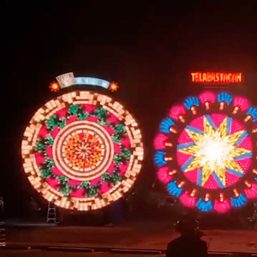SUMMARY
This is AI generated summarization, which may have errors. For context, always refer to the full article.
![[REFLECTIONS] Peace on earth](https://www.rappler.com/tachyon/2023/12/peace-on-earth-december-23-2023.jpg)
Once again, we feel magic in the air, the season of Advent summoning memories of what it was like when we were all children celebrating an event that history tells us marked the birth of the Messiah and the beginning of his kingdom.
Growing up, it was not clear to me how a Jewish baby born 2,000 years ago could save us, especially when viewed from the horrific travails of the present.
Nevertheless, I loved the bright lights, the parol hanging on windows, and waking up at dawn for Simbang Gabi with my older sisters who sang in the choir, not because I was all that religious, but because I always looked forward to coming out to the courtyard after mass, the smell of bibingka burning on coals and the puto-bumbong steaming out of bamboo tubes, wafting a dreamy mist into the crisp night air.
Together with friends in the neighborhood, we would improvise musical instruments out of bamboo, bottle caps and tin cans, and sing carols and knock on doors and merrily go home with coins jingling in our pockets. It was an age of innocence, when we were confident that our “Namamasko po,” would be met with generous kindness and hospitality, and families would come together for cherished traditions like Noche Buena and renew memories of what it was like before the golden gates of childhood shut the doors on us.
Where has it all gone – the merrymaking, the joy and the peace and the goodwill announced upon the birthing of the Christ-Child?
The children who go out into the streets to carol, particularly those from urban poor communities, get shooed away as mere nuisance. The homeless who have proliferated through the years have occupied Luneta as space for celebrating the savior who in his lifetime had nowhere to lay his head. Filipinos overseas long for home, easing their loneliness by sending balikbayan boxes to make up for their absence. Those left behind feel the emptiness of chairs and tables unoccupied by family members who are no longer present.
Come Christmas time, we mouth platitudes about the Prince of Peace. But then the UN Security Council says, ‘Peace, peace,’ but no one pays attention. The superpowers keep arming themselves and their allies, whether Israel or Hamas, stockpiling weapons to annihilate those they have identified as enemies.
How will the coming of the Prince of Peace turn swords into ploughshares?
Power over death
We are told that God, in finally providing a solution to the problems of the world, sent his son to a place of extreme vulnerability. The son was not simply stripped of all the trappings of being king, but was born as a helpless baby wriggling on a bed of hay, with cows and sheep as first witnesses, and with a poor carpenter as foster father and a teenaged woman as mother who was always subjected to gossip as to the origin of his birth.
He was to win the war against evil, not by force of arms, but by the supreme weakness of hanging on a cross like a common criminal. By rising again, he has shown that he has power over death. He told his followers not to fear even when they were being fed to the lions, for “I have overcome the world.” They were to spread the news among the nations that a new form of power has come into the world, and in so far as his followers remain subject to the social ethic of his kingdom, justice and righteousness in their societies will have begun.
The kingdom Jesus inaugurated turns the world upside down, but quietly and no less effectively, inviting those who would be subject to it to become not so much revolutionaries as subversives, peaceable citizens who bear witness to the reality and presence of another, kinder world.
This new social order demands that its citizens cross borders of ethnicity, gender and economic status and demonstrate that in Christ, equality is possible between Jew and Greek, male and female, rich and poor. They are to see to it that in their dealings, the first should be last and the last first. They are to live with the confidence that strength is won out of weakness, and that those who seek authority will find greatness in being servants of all.
Hard pragmatists dismiss this social ethic as unrealistic. Yet we have seen it operating even in recent history.
Toppling despotic regimes
Even without coercive power, those who possess great moral force could topple despotic regimes. Mahatma Gandhi, that great soul of the Indian struggle for independence, never held office. Yet he galvanized his people by taking a moral high ground that unmasked the savagery of British imperialism by his very refusal to resort to violence.
The US civil rights movement was led by a preacher who had a dream and believed that equality for blacks can be won by non-violent resistance. It started with one small act of protest by a woman, Rosa Parks, who refused to give up her seat to a white man and go back to the back of the bus which was designated for African Americans. Rosa Parks has shown that we can fight for our beliefs by not tolerating everyday acts of injustice and oppression.
“You must never be fearful about what you are doing when it is right,” she once said. This was the same courage that animated many who went to EDSA and risked their lives facing oncoming tanks. The most powerful president we have ever had was toppled in just four days of unarmed siege, which surprised even those of us who thought that a fractious and divided people cannot ever mount such an uprising.
Likewise, Nelson Mandela thought that he would rot in jail for his anti-apartheid activism. But then the Prime Minister, F.W. De Klerk, at the urging of his pastor who feared that violence was inevitable, visited him in prison and quietly negotiated with him the process of fully dismantling apartheid and establishing a transition to universal suffrage. Mandela was the soul and leader of the restive African National Congress, so along with Bishop Desmond Tutu, they stayed the hand of bloodshed and led the ANC to victory in the 1994 non-racial election. De Klerk publicly apologized for apartheid’s harmful effects. He and Nelson Mandela were awarded the 1993 Nobel Peace Prize for their contribution to the peaceful elimination of apartheid in South Africa.
Part of the paradox of power is that it has most use and force when it is wielded by those who are most disinterested in its use.
Winning strength out of what seems to be weakness is the exact opposite of resorting to militarism as the way to national defense and security. “We seem stuck with Might – the central political failure of humankind,” says Alan Storkey, a British economist.
But in truth, militarism and war as a solution to, say, Israel’s vulnerability or Russia’s fear of western powers’ over-reaching influence in the Ukraine, does not work. Says Storkey, “Since 1900 they have killed 200 million people, traumatized a billion and destroyed tens of millions of homes. We have had two World Wars, a long Cold War and about two hundred wars down to Russia/Ukraine and Gaza/Israel now. Wars keep coming and do not work.”
In our home ground, we have had a 50-year insurgency that has cost the national coffers billions and sapped the energies of what could have been a generation of social idealists wanting change. These days, we are seeing a flickering light at the end of the long tunnel. Both the National Democratic Front representatives and the Government panel of negotiators have issued a joint statement to negotiate a principled peace, quietly brokered by the Norwegians.
There will of course be the hardliners on both sides who will throw a wrench, believing that victory and power can only grow out of the barrel of a gun.
But then the Prince of Peace has come. The Herods of this world may turn their murderous rage against innocent children. Yet contrary to appearances, and usually under radar screen, the war of the Lamb against evil is winning. – Rappler.com
Add a comment
How does this make you feel?
![[REFLECTIONS] None too poor; no one too rich](https://www.rappler.com/tachyon/2022/07/farmers-rappler-20130422.jpg?fit=449%2C360)
![[EDITORIAL] Kailangan ng isang ‘humanitarian ceasefire’ sa Gaza](https://www.rappler.com/tachyon/2023/11/animated-israel-hamas-gaza-carousel.jpg?fit=449%2C449)

![[Vantage Point] My Christmas reflections: Navigating the changing tides of 2023 and moving forward](https://www.rappler.com/tachyon/2023/12/changing-tides-moving-forward-december-24-2023.jpg?resize=257%2C257&crop=399px%2C0px%2C1080px%2C1080px)

![[REFLECTIONS] A light has shone](https://www.rappler.com/tachyon/2023/12/Skepe-Nativity_Scene.jpeg?resize=257%2C257&crop=179px%2C0px%2C877px%2C877px)
![[REFLECTION] Liwanag sa dilim](https://www.rappler.com/tachyon/2023/12/Patnubay-patnubay-9.jpg?resize=257%2C257&crop=218px%2C0px%2C720px%2C720px)
There are no comments yet. Add your comment to start the conversation.